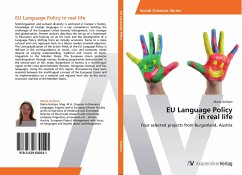Multilingualism and cultural diversity is anchored in Europe s history. Knowledge of foreign languages is a key competence tackling the challenges of the European Union towards enlargement, civic changes and globalisation. Present analysis describes the set-up of a framework in Education and Training on an EU level and the development of a Language Policy shifting from an initially economic frame to a more cultural and civic approach back to a labour market oriented objective. The conceptualization of the action fields of the EU Language Policy is defined in the correspondence to social, civic and economic needs despite of varying understanding, tradition and visions of multi-lingualism in the Member States. The European Union promotes multilingualism through various funding programmes demonstrated in the second part of this study. Burgenland in Austria is a multilingual region at the cross-point between German, Hungarian, Romani and Slav languages. Using the example of this region, discrepancies have been revealed between the multilingual concept of the European Union and its implementation on a national and regional level due to the socio-economic realities of the Member States.
Bitte wählen Sie Ihr Anliegen aus.
Rechnungen
Retourenschein anfordern
Bestellstatus
Storno

